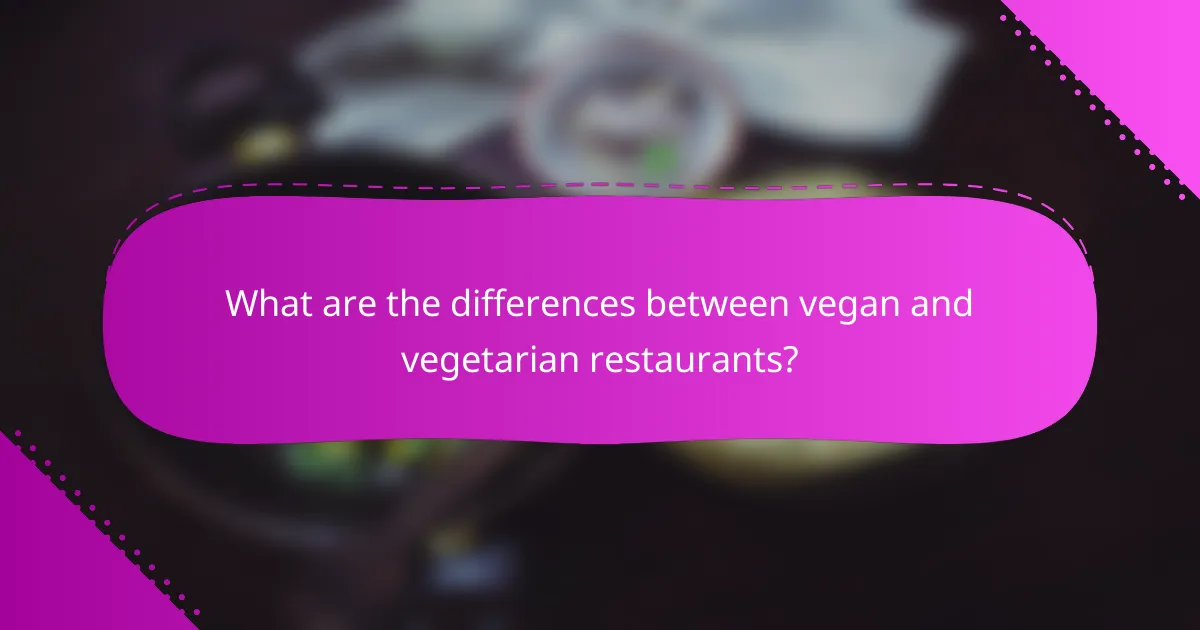Canada boasts a vibrant array of vegan restaurants that prioritize plant-based options, health-focused meals, and sustainable practices. In cities like Toronto, Vancouver, and Montreal, diners can explore diverse menus that cater to various tastes while enjoying the numerous health benefits associated with a vegan diet.

Where to find the best vegan restaurants in Canada?
Canada offers a vibrant selection of vegan restaurants that focus on plant-based options, health-conscious meals, and sustainable practices. Major cities like Toronto, Vancouver, and Montreal are home to some of the best spots, each with unique offerings that cater to diverse tastes and dietary needs.
Top-rated vegan restaurants in Toronto
Toronto boasts a variety of top-rated vegan restaurants known for their innovative dishes and commitment to sustainability. Popular choices include “Planta,” which offers a diverse menu featuring everything from sushi to desserts, and “Fresh,” known for its health-focused bowls and smoothies.
When visiting, consider trying their signature dishes like the “Planta Burger” or the “Fresh Bowl,” which highlight the flavors of plant-based ingredients. Reservations are recommended during peak hours, especially on weekends.
Popular vegan spots in Vancouver
Vancouver’s vegan scene is thriving, with many popular spots that emphasize fresh, local ingredients. “The Acorn” is a standout, offering a seasonal menu that changes frequently to reflect the best produce available. Another favorite is “MeeT,” known for its comfort food and casual atmosphere.
For a unique experience, try the “Acorn’s Tasting Menu,” which features a variety of small plates, or indulge in “MeeT’s Mac and Cheese.” Both restaurants often have long wait times, so arriving early or making a reservation is advisable.
Best plant-based eateries in Montreal
Montreal is home to some of the best plant-based eateries in Canada, with a focus on both traditional and modern cuisine. “Lola Rosa” is well-loved for its hearty comfort food, while “L’Gros Luxe” offers a fun twist on classic dishes in a vibrant setting.
Don’t miss the “Lola Rosa Nachos” or the “L’Gros Luxe Poutine,” which showcase the creativity of vegan cooking. Many of these restaurants are located in lively neighborhoods, making them perfect for a night out with friends or family.

What are the health benefits of vegan dining?
Vegan dining offers numerous health benefits, primarily due to its focus on plant-based foods that are rich in nutrients. Adopting a vegan diet can lead to improved overall health, including lower risks of chronic diseases and better weight management.
Lower cholesterol levels
One significant benefit of vegan dining is the reduction in cholesterol levels. Plant-based diets are typically low in saturated fats found in animal products, which helps maintain healthy cholesterol levels. Foods such as fruits, vegetables, whole grains, and legumes are rich in fiber, which can further aid in lowering cholesterol.
Incorporating foods like oats, beans, and nuts into your meals can be effective in managing cholesterol. Regularly consuming these foods can lead to a noticeable decrease in LDL (bad cholesterol) levels over time.
Improved digestion
Vegan dining can enhance digestive health due to its high fiber content. Fiber-rich foods, such as vegetables, fruits, and whole grains, promote regular bowel movements and overall gut health. A well-functioning digestive system can help prevent issues like constipation and bloating.
To maximize digestive benefits, include a variety of fiber sources in your diet. Aim for at least 25-30 grams of fiber daily, which can be achieved through a balanced intake of legumes, whole grains, and fresh produce.
Weight management
Vegan dining can support effective weight management due to its emphasis on nutrient-dense, low-calorie foods. Plant-based diets are often lower in calories while being high in essential nutrients, making it easier to maintain a healthy weight. This can be particularly beneficial for those looking to lose or maintain weight.
To aid in weight management, focus on whole foods like vegetables, fruits, and whole grains while limiting processed vegan options. Regular meal planning and mindful eating can help you stay on track with your weight goals.

How do vegan restaurants ensure sustainability?
Vegan restaurants promote sustainability through various practices that minimize environmental impact. These practices often include sourcing ingredients locally, reducing waste, and using eco-friendly packaging.
Locally sourced ingredients
Many vegan restaurants prioritize locally sourced ingredients to reduce their carbon footprint and support local economies. By sourcing produce, grains, and other items from nearby farms, they ensure freshness and lower transportation emissions.
Choosing seasonal ingredients is another way to enhance sustainability. Seasonal produce typically requires less energy to grow and transport, making it a more environmentally friendly option.
Waste reduction practices
Vegan restaurants implement waste reduction practices by minimizing food waste and recycling whenever possible. Techniques such as composting organic waste and donating surplus food to local charities help divert waste from landfills.
Some establishments also adopt a zero-waste philosophy, aiming to use every part of an ingredient. For example, vegetable scraps can be used to make broths or stocks, further reducing waste.
Eco-friendly packaging options
To further their sustainability goals, vegan restaurants often use eco-friendly packaging options. Biodegradable containers, compostable utensils, and recyclable materials help minimize plastic waste.
When possible, restaurants encourage customers to bring their own containers for takeout, which not only reduces packaging waste but also promotes a culture of sustainability among patrons.

What are the most popular vegan dishes?
The most popular vegan dishes focus on plant-based ingredients that deliver flavor and nutrition. Common options include vegan burgers, plant-based sushi, and raw food salads, each offering unique tastes and health benefits.
Vegan burgers
Vegan burgers have gained immense popularity as a satisfying alternative to traditional meat patties. Made from ingredients like black beans, lentils, or chickpeas, these burgers are often packed with protein and fiber.
When choosing a vegan burger, look for options that use whole food ingredients and minimal additives. Many restaurants offer house-made versions that can be customized with toppings like avocado, vegan cheese, or fresh vegetables.
Plant-based sushi
Plant-based sushi presents a creative twist on traditional sushi, using vegetables, fruits, and plant-based proteins. Common fillings include avocado, cucumber, and marinated tofu, wrapped in sushi rice and seaweed.
For the best experience, seek out sushi restaurants that specialize in vegan options, as they often provide unique flavor combinations and artistic presentations. Pair your sushi with soy sauce or wasabi for added taste.
Raw food salads
Raw food salads emphasize fresh, uncooked ingredients, making them nutrient-dense and refreshing. Ingredients often include leafy greens, nuts, seeds, and a variety of colorful vegetables.
When preparing a raw salad, consider adding a homemade dressing made from olive oil, lemon juice, and herbs to enhance flavor. Be mindful of portion sizes, as adding too many toppings can increase calorie content significantly.

How to choose a vegan restaurant?
Choosing a vegan restaurant involves considering menu variety, customer reviews, and location. These factors can help ensure a satisfying dining experience that aligns with health-focused and sustainable practices.
Menu variety
A diverse menu is essential when selecting a vegan restaurant. Look for establishments that offer a range of dishes, including appetizers, main courses, and desserts, to cater to different tastes and dietary preferences.
Some restaurants may focus on specific cuisines, such as Italian or Asian, while others provide a fusion of flavors. Checking the menu online before visiting can help you gauge whether the options meet your expectations.
Customer reviews
Customer reviews are a valuable resource for assessing the quality of a vegan restaurant. Platforms like Yelp or Google Reviews can provide insights into the dining experience, including food quality, service, and ambiance.
Pay attention to comments about specific dishes and overall satisfaction. A restaurant with consistently positive feedback is likely to offer a better experience than one with mixed reviews.
Location and accessibility
The location of a vegan restaurant can significantly impact your dining experience. Consider how easy it is to reach the restaurant, whether by public transport or car, and check for available parking options.
Accessibility is also crucial for individuals with mobility challenges. Ensure the restaurant has facilities like ramps or accessible restrooms to accommodate all guests comfortably.

What are the differences between vegan and vegetarian restaurants?
Vegan restaurants exclusively serve plant-based dishes, while vegetarian restaurants may include dairy and eggs. Understanding these distinctions helps diners choose options that align with their dietary preferences and ethical considerations.
Animal product restrictions
Vegan restaurants do not allow any animal products, which means no meat, dairy, eggs, or honey in their offerings. This strict adherence to plant-based ingredients appeals to those committed to animal rights and environmental sustainability.
In contrast, vegetarian restaurants permit certain animal-derived items, such as cheese and eggs, allowing for a wider variety of dishes. This flexibility can attract a broader audience, including those who are reducing meat consumption but still enjoy some animal products.
When dining out, it’s essential to check menus or ask staff about specific ingredients to ensure they meet your dietary needs. Many vegan restaurants highlight their commitment to sustainability and health, often using organic and locally sourced ingredients.
